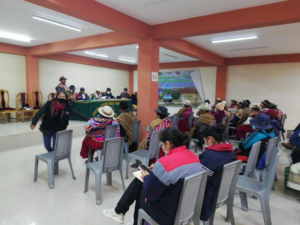
The Eyes of Bolivia project has taken a step forward in facilitating access for the student population in rural areas of Oruro and Tarija to early identification of visual impairments and their resolution.
In the case of Oruro, with the involvement of all stakeholders, rights holders and responsibilities, Eyes of the world has ensured that schools in the Department, including special education schools, have developed school eye health plans aimed at ensuring the schooling of students with avoidable vision loss and improving their quality of life.
The project, centred in the schools themselves, guarantees the early detection of refractive deficiencies by teachers (previously trained in visual acuity testing) and supervised by professionals from the public health system. It also ensures access to the necessary treatment thanks to the resources provided by the municipal governments.
Eyes of the world has carried out awareness-raising and advocacy work with local authorities to make them aware of the benefits of these school plans for the eye health of current and future students, and to maintain the necessary budget allocation for the donation of corrective lenses to children who require their use.
This accompaniment work carried out by the Foundation has also included the follow-up and monitoring of the students’ adherence to the glasses, a few months after receiving them, and guaranteeing the families’ commitment to the project and the correct use of the glasses by the students.
These activities, carried out within the framework of the Eyes of Bolivia project, have been supported by CBM, the Abrera Town Council, the ONCE Latin America Foundation (FOAL), the Sangüesa Town Council, the Repsol Foundation and the Balmaseda Town Council.